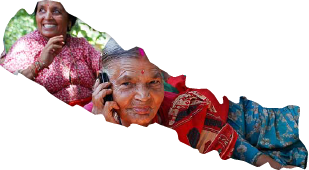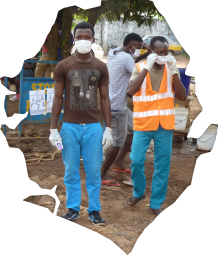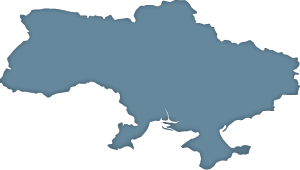GROUND TRUTH SOLUTIONS
Supporting Humanitarian Actors to Systematically Listen<br>and Respond to the Voices of Affected People
Our Work
Our work ranges from collaboration with individual organisations to response-wide interventions.
The aim of the project is to include the views, perceptions and priorities of the affected people in the implementation of Chad’s Humanitarian Response Plan. The project, which is a collaborative effort between Ground Truth Solutions and the Core Humanitarian Standard Alliance, is funded by the Swedish International Development Agency (SIDA). Chad is challenged by widespread poverty and low economic development and a range of interlinked humanitarian crises including internal displacement, food insecurity and malnutrition, a mounting burden of disease and associated mortality.
Recurring humanitarian crises add a layer of misery to already vulnerable people, exacerbating their exposure to harm and reducing their resilience. GTS will systematically collect and analyse feedback from affected people on key dimensions of humanitarian performance linked to the Core Humanitarian Standard. Working with the CHS Alliance, the project will help develop capacity of the Humanitarian Country Team (HCT), national NGOs and other stakeholders to use the CHS as a framework to improve policies and processes around quality and accountability.
.
As part of the H2H Network, Ground Truth Solutions is providing humanitarian actors and government agencies in the Caribbean with the means to systematically listen, react, and respond to the views of people affected by Hurricanes Irma and Maria. The H2H network is a group of not-for-profit organisations that provide products and services to other humanitarian organisations, to improve the effectiveness of emergency response and facilitate two-way communication with affected populations.
Through a series of surveys in Dominica, Antigua and Barbuda, Ground Truth Solutions will provide a regular flow of feedback to key actors on community perceptions of their evolving needs and the effectiveness of the response. This will allow decision-makers to better understand community concerns, manage expectations, and make adjustments to the response.
Ground Truth Solutions is one of seven NGOs working together on a new platform to provide research, analysis and policy recommendations about mixed migration patterns in the Middle East and Europe. The initiative aims to provide quality information to improve decision-making. People on the move in the Middle East and Europe as well as host governments and humanitarian organisations involved in the response are targeted for platform services.
Ground Truth Solutions’ contribution to the platform will be real time collection and analysis of feedback in five countries about the perceptions of people in different stages of displacement (borderlands, transit countries and states of final destination).
During the 2016 World Humanitarian Summit, leading donors and aid providers agreed to the Grand Bargain, a shared commitment to better serve people in need. Ground Truth Solutions is partnering with the OECD secretariat to track the way people affected by humanitarian crises experience reforms set out in the Grand Bargain.
The six targeted countries represent a diverse set of humanitarian contexts and Ground Truth Solutions will gather data from affected people as well as field staff in order to provide insight on whether and how reforms set out in the bargain promote more effective and responsive aid.
Ground Truth is partnering with the International Committee of the Red Cross (ICRC) to track the perceptions of people who receive assistance in relation to the hostilities between government forces and an armed group in Zamboanga in 2013. The collaboration was launched in early 2017 and aims to better understand not only people’s physical needs but also their experience with and expectations of the ICRC.
Keeping a regular dialogue with affected people is important to the ICRC’s acceptance, access and security, as well as to the effectiveness and accountability of its work.
Ground Truth Solutions is partnering with the International Federation of Red Cross and Red Crescent Societies (IFRC) to track the perceptions of migrants and host communities through regular surveys in two pilot countries in Europe in order to inform IFRC operations aimed at reducing the vulnerability and suffering of migrants arriving in Europe.
Ground Truth’s work will focus on better understanding the experiences of newly arrived people and of those stranded along the migratory trail. There will also be a survey among migrants to track their perceptions of the challenges they face integrating into host societies, while host community surveys will track public perceptions on the acceptance of migrants.
Based on Ground Truth Solutions’ tested approach to collecting and responding to feedback in humanitarian settings, the Cash Barometer combines standardized face-to-face surveys with qualitative data collection. We ask a small number of questions relating to the relevance and effectiveness of cash-based assistance—both on its own merits, compared to and in combination with other programming modalities.
Focus areas revolve around satisfaction with cash-based programs, their perceived fairness, expectations towards aid actors and the impact of cash transfers on people’s sense of agency and dignity. Our aim is to provide actionable information from affected people that can be translated into program improvements, while empowering people to express their views.
ENGAGE is a collaborative venture led by Ground Truth Solutions, ACAPS, and Internews that aims to provide an advanced set of emergency assessment, feedback, and communication tools to the humanitarian community during crises. Through ENGAGE, responders receive essential feedback from affected people that helps to shape decisions about the delivery of aid – and at the same time ensures that those in need fully understand their options to access and influence aid provision.
Members of ENGAGE will work closely with humanitarian teams on the ground while retaining the independence of action and analysis that is key to providing impartial and reliable information. ENGAGE provides services at the onset of an emergency and continues to do so until alternative collective arrangements are in place – or until its services are no longer required, once responsibility can be transferred to local or other specialised agencies.
After the devastating earthquakes in April and May 2015 we operated as part of this Inter-Agency Community Feedback Project, a common effort to track perceptions and push for better communication with affected communities. Partnering with two local NGOs (Accountability Lab and LIG), Ground Truth’s role was to provide the government of Nepal and aid agencies with real-time feedback from affected people, and recommendations based on that feedback. Having designed and implemented the community perception
surveys, and analysed and reported on the first 3 rounds of data, Ground Truth stepped down from the Common Feedback Project. We helped build the capacity of our local partners so they can continue the work.
We also worked with Integrity Action and their local affiliate, Youth Initiatives, to turn the feedback data into a tool for community mobilisation around key issues revealed by it.
In September 2015, Ground Truth launched into a new partnership with the International Rescue Committee (IRC), as part of their Client Voice and Choice initiative. The initiative is funded by DFID and aims to explore innovative tools that can bring client perspectives more systematically into decision-making calculations. Ground Truth aimed to analyse how our micro-surveys could be
better used to collect meaningful feedback data from the clients of IRC’s projects. IRC staff’s feedback on their experience with the Ground Truth’s methodology, alongside perceived improvements in programme responsiveness by clients themselves, all contribute to project learning – and were shared across the humanitarian sector.
Another major opportunity is the Listen Learn Act project, implemented together by DanChurch Aid, Save the Children Denmark, and Ground Truth with the financial support of the European Union. The project is absolutely timely, as it aims to explore the use of Ground Truth’s methodology as a tool to measure and improve compliance with the new Core Humanitarian Standard
through the eyes of affected people. Working with a total of 16 partner organisations across 4 different countries and contexts, we are gathering feedback from affected people on the relevance of the services provided, the usefulness of existing complaint mechanisms, and how effective humanitarian organisations are at including people’s voices into their work.
In Sierra Leone, we were commissioned by DFID to provide a regular flow of feedback from frontline workers and from the general public about the way they see the disease, the obstacles to tackling the virus, and the whether they believe progress is being made against the spread of the disease. We conducted 4 micro-surveys with a total of 45 rounds of data collection to capture the voices of citizens in quarantine, citizens whose homes
were decontaminated following an Ebola case, and frontline workers.
Through this DfID-funded project, Ground Truth could provide programme managers involved in the Ebola response with a regular flow of data, which helped to elicit useful insights, locate shortcomings of the response, and initiate successful programme changes.
In Ukraine, Ground Truth worked with the office of the Prime Minister to provide regular feedback on the perceptions of the thousands of internally displaced people (IDPs) who have fled fighting in the eastern provinces and are now struggling to survive in
what are precarious circumstances. The feedback and analysis provided by Ground Truth was intended to inform the government’s policy towards IDPs and to improve the effectiveness of communication.
Never miss a story and get regular updates from Ground Truth Solutions
Subscribe to our



